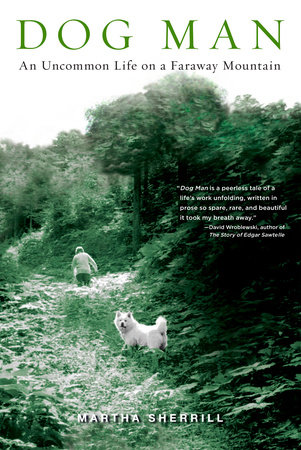READERS GUIDE
Questions and Topics for Discussion
INTRODUCTION
At the end of World War II, there were only 16 Akita dogs left in Japan. Morie Sawataishi became obsessed with preventing the extinction of the 4,000-year-old breed. He defied convention, broke the law, gave up a prestigious job, and chose instead to take his urbanite wife to Japan’s forbidding snow country to start a family, and devote himself entirely to saving the Akita.
Martha Sherrill blends archival research, on-site reportage, and her talent for narrative to reveal Sawataishi’s world, providing a profound look at what it takes to be an individual in a culture where rebels are rare, while expertly portraying a side of Japan that is rarely seen by outsiders.
ABOUT MARTHA SHERRILLMartha Sherrill is a former Washington Post staff writer. Her award-winning writing has appeared in Esquire and Vanity Fair, among other publications. She lives in Massachusetts with her husband and son.
DISCUSSION QUESTIONS`Dog Man is about one man’s bond with his dogs, but more broadly, it’s about deciding what you want your life to be about, and pursuing your passions. As Newsweek said, it is about “the search for enduring values and the determination to live life on one’s own terms.” What does Morie’s dream cost him and his family? What do they gain from it?Morie is thirty years old when he brings home his first dog, an Akita puppy. He tells himself that he wants to protect the Akita breed from dying out during World War II. As Martha Sherrill writes in the Introduction, the Akita is “the local dog, the regional dog, the breed he’d seen everywhere as a child growing up in the snow country.” At the time, most people don’t consider the breed worth saving. What about these dogs attracts Morie most? What is he really trying to protect and keep alive?The story of Dog Man spans sixty-five years. It begins in the midst of World War II and ends in the 21st century. Some readers have said it is a story that only could have happened in Japan. Others say it could have happened anywhere. What do you think?The book is also a portrait of a marriage, and at key moments in the story, Kitako looms as large as Morie. Would you call their marriage a happy one? What does Morie receive from the dogs that he does not receive from his wife? Does being married make it more difficult to live life on one’s own terms?Nature—and the wild—plays a leading role in the book. It is not simply a backdrop to Morie’s story, but a spiritual and moral force. How does Nature affect the evolution of Morie’s thinking and life? What does he learn from the wilderness that he didn’t know before?Over the years, Morie gradually flees modern civilization in pursuit of a different way of life. Yet civilization finds Morie and decides his story has something valuable to tell us. Why do you think civilization often cherish those who reject its values? Is there something wrong with a country that produces rebels like Morie, or conversely, are rebels a sign of a society’s health?

